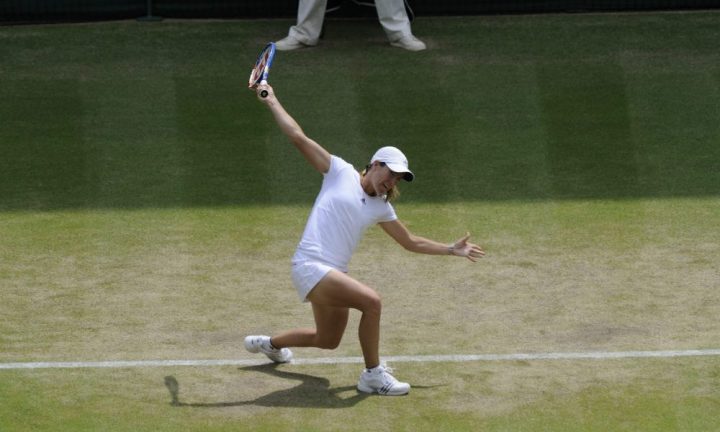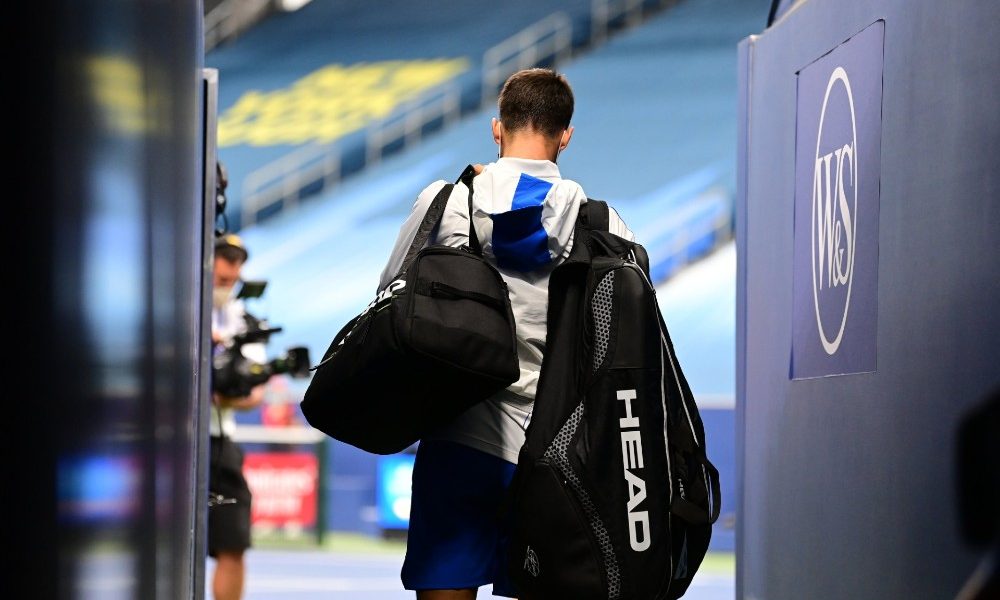Eurosport invited UbiTennis’s CEO Ubaldo Scanagatta to join a Q&A with the former Slam champions and world numbers ones, who dicussed the 2020 US Open (but refused to pick a winner for either draw).
Justine Henin and Boris Becker need no introduction: seven Slam titles and three years finished as the world N.1 for the 38-year-old Belgian, six and one for the German, now 52 (he was never actually ranked at the top at the end of a season, but won the ATP Player of the Year award in 1989, when he won two Majors). They are definitely cognizant of what it takes and means to get to the end of a US Open fortnight (Henin won it twice, Becker once), although the 2020 milieu is a bona fide unknown for pretty much everybody in tennis.
This is why they have accepted to join a Q&A session of about half an hour, organised by Eurosport (the channel that they both work for, and that we thank once again for the invite), during which they tackled many subjects, mostly revolving around Novak Djokovic, his default loss at the hands of Pablo Carreno Busta, and the future of the PTPA, his new players’ union – Becker coached the Serbian for three seasons (winning six Slams).
Here’s the full transcript:
D: We are almost at the end of the tournament, and we have seen many controversial decisions. What will be the most important lesson to be taken for the rest of the season?
HENIN: I don’t know, it’s an interesting question. We are all wondering how we feel about this tournament. I’m glad that it took place despite the absence of the fans, who can still watch on TV, while the players can still do their jobs and are fully aware of the situation. What we can learn is that this is a unique situation fo everyone. We need to remember that nobody is perfect and that these are exceptional circumstances, but we all need to adapt – players, officials, tournaments, everybody. Our job is about adapting, so I think it’s normal to have witnessed all these ups-and-downs. Anyway, we also need to keep in mind that we are only talking about tennis, which gives us great emotions but is not the most important thing right now. The tournament hasn’t been perfect, but it’s a good start, everyone is okay, and we all need to learn our own lessons.
Q: I was at the O2 when Djokovic was booed for double faulting, and we are talking about someone who has won 17 Slams. Does he get the respect he deserves?
BECKER: I don’t think so, it’s a very good point. In men’s tennis, fans are divided between Federer and Nadal. And then here comes Djokovic who crashes the party – this is why he gets so much criticism. Right now, he is in a s**tstorm because of what he did against Carreno, but he took responsibility for his actions and apologised, firstly to the woman, then to the USTA and to the players. Nobody is perfect. Roger double faults, Rafa double faults, they don’t get booed.
Q: How does he take it?
BECKER: He doesn’t like it, nobody would. He’s a people person, he does a lot of charity work in Serbia through his foundation. And yet people only talk about him when he breaks the rules. He is a champion, he always wants to win, but sometimes he makes mistakes too.
Q: Justine, do you think that there is a lack of respect for Djokovic and for what he has achieved?
HENIN: It’s very strange. Personally, I respect the champion he is. You can like or not his on-court personality. We are witnessing a golden age in men’s tennis because of the Big Three, but also because of all the players who are coming up behind them. Novak is different from Rafa and Roger, and he also broke onto the scene a little later, ma we have to have the utmost respect for what he’s doing in tennis.
D: Will this premature elimination in New York help him at the French Open?
BECKER: I like your positive attitude, very forward-looking! Novak is still digesting what happened, but he has to view this episode as an opportunity to make some noise on the court and to win more. The question is whether he will play in Rome before Paris – he is very popular in Italy. I think he is a contender at the French Open, he and Thiem can challenge Nadal.
Q: Will the players be more careful because of what happened to him?
HENIN: We are all human beings. It reminds us that we need some humility and that players can make mistakes. In the end, even if Novak is a champion, he can still make mistakes. It’s not easy to control the pressure and one’s emotions during a match. It’s a lesson for all of us, not just for the players. The rule is good because we have to protect the officials and the fans. Maybe some people think that it should be changed, but I don’t agree, because it pushes the players to control their emotions and frustrations. However, it was bad luck in Novak’s case.
D (UbiTennis): I’d like to ask Justine what she thinks about the PTPA, and whether it will be successful.
HENIN: I think Boris has more details about it, I’m not too informed on the subject. We want the players to be united and to be represented in the right way in tournaments. It’s hard for me to judge which is the best way to achieve this. There are many different opinions on the matter. Boris, what do you think?
BECKER: The ATP was founded in 1972 by the players. Over time, it became the ATP Tour, which has two sides: the players and the tournaments. Apparently, many players don’t feel that they are being well-represented by the ATP, and this is the reason why the new association was created. I would like to see them involve female players. I would like for the ATP and the WTA to do something together. This is the only mistake I see. But in principle I think it’s right that the players should have a voice within the ATP, whose structure is different than it was in 1972.

Q (UbiTennis): Why do you think Nadal and Federer didn’t concur with Novak’s message? I don’t think he wants to fight with the Players Council, and I think he wants to involve some women as well, from what I understand.
BECKER: I think that Federer and Nadal have different agendas. They are making history, and they also don’t have a personal history of political involvement, which is a smart thing to do, according to some. But they are also the most famous faces in men’s tennis. There should have been a unanimous decision over the new association, but there are many different opinions. Therefore, Nadal and Federer’s interests are not the same as Djokovic’s. I’d like to see the ATP and the WTA unite, but I don’t think we have that right now.
Q: Could the ball abuse violation be softened in some cases, in order to avoid episodes like the one involving Djokovic, who hit the lineswoman in a clearly unintentional way?
HENIN: I think that the rule is fair, but this is just my opinion. Where would we draw the line, were we to soften it? Many people think that the decision with Djokovic was too harsh because Bedene wasn’t disqualified the previous week, but I think that the two episodes are completely different. I have never seen anyone on a tennis court who tried to hurt somebody intentionally, but you can hurt people even unintentionally, and we need to control these cases by creating limits that shouldn’t be broken. It also serves as a message to everybody else. We are not perfect, but we need to be examples and to inspire people. I also think that this is an experience that can be used to grow. I have never been involved in something like this, but I’m sure it will be tough for Novak’s ego. It also means that he isn’t a machine, and I like that. Back to the point, I wouldn’t change the rule.
BECKER: I mostly agree with Justine. It was tough for Novak, and you know I’m a fan of his, but in a certain way he has been lucky, because that woman could have been hurt a lot worse. The rule is clear. Novak had already hit a ball against the wall, and he was clearly frustrated, he was dominated by his own emotions. We shouldn’t think that he is a bad person, we both know that emotions come out during a match, and that it is part of human nature to misbehave when things are not going our way. I wouldn’t change the rule, because players are role models. This was an unfortunate instance, but the decision was right
On page 2, the interview will shift to the mental toll that tennis players have to shoulder, as well as to Becker’s vacation with Bjorn Borg and to Kim Clijsters’ comeback






